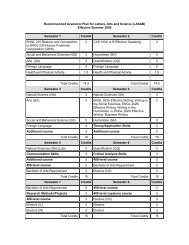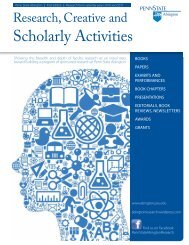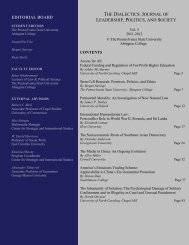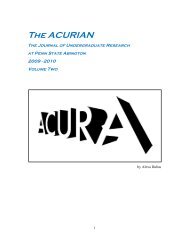Vol. III - Penn State Abington
Vol. III - Penn State Abington
Vol. III - Penn State Abington
Create successful ePaper yourself
Turn your PDF publications into a flip-book with our unique Google optimized e-Paper software.
UGANDA: CONFRONTING A HUMAN RIGHTS CRISIS<br />
By Meagan Boonie ∗<br />
The <strong>Penn</strong>sylvania <strong>State</strong> University<br />
<strong>Abington</strong> College<br />
“What began as a vaguely ideological war against perceived ethnic discrimination by the<br />
government degenerated into something close to madness” (McCrummen, 2008). Such is the<br />
case of the 23-year crisis surrounding the Lord’s Resistance Army in Uganda. It is rooted in the<br />
country’s political turmoil, present since its independence in 1962, and it has become a human<br />
rights tragedy plaguing Central Africa. Over the years, unspeakable crimes against civilians have<br />
been committed by the LRA, including the abduction of tens of thousands of children, killing<br />
and mutilating thousands more. The Ugandan national army, known today as the Ugandan<br />
People’s Defense Force (UPDF), is also guilty of committing atrocities, including killing<br />
civilians and raping women—carelessly transmitting HIV/AIDS throughout the country.<br />
Uganda has been plagued by this war for almost two dozen years. It is clear that a series<br />
of steps must be taken to help remedy the immediate situation by stopping the violence that is<br />
terrorizing Ugandans, providing a return to a normal climate, allowing the Internally Displaced<br />
Persons to safely return home, and holding accountable all who are guilty of these human rights<br />
abuses. It is also important to provide the foundation for a stable and healthy Uganda in the long<br />
term, by pushing for a transparent and accountable government and rehabilitating the<br />
traumatized.<br />
Uganda’s regionalization can be traced back to the times of British Colonization; it sets<br />
the stage for years of conflict between the northern and southern regions of Uganda. The<br />
southern region’s climate and resources were deemed more economically viable than those of<br />
Northern Uganda. A “divide and rule” strategy was implemented and found to be especially<br />
helpful to the British since the people of Uganda were pinned against each other, reducing the<br />
possibility of a rebellion. This North-South divide marks an extremely notable theme in Uganda,<br />
past and present.<br />
When Uganda gained its independence from the British Empire in 1962, Milton Obote<br />
was chosen as the first Prime Minister. He was thrown out of office nine years later in 1971 by<br />
Colonel Idi Amin, an event that commenced a power struggle between the two figures. Between<br />
1971 and 1979, more than 300,000 civilians were executed, suspected of threatening Amin’s<br />
power. When Obote reinstated himself as dictator of Uganda in 1980, current president Yoweri<br />
Museveni created the National Resistance Army with the hopes of ousting Obote, which he did<br />
successfully in 1986. It was this overthrow that set the stage for the Lord’s Resistance Army to<br />
assume power and create what Senator Sam Brownback of Kansas later described as the<br />
“world’s most neglected humanitarian crisis” (US Dep’t of Congress, 2009).<br />
In an effort to extinguish Museveni and his National Resistance Army throughout the<br />
country, Obote called upon the national military, at the time named the Ugandan National<br />
Liberation Army. This was the same army Amin had used less than a decade earlier to secure his<br />
own position in Ugandan politics against Obote. Between the two administrations, the UNLA is<br />
∗ Meagan Boonie is a sophomore at the <strong>Penn</strong>sylvania <strong>State</strong> University, <strong>Abington</strong><br />
College, with a major in international politics. She is also a member of the College’s<br />
Honors Program.<br />
THE DIALECTICS ▲ 2009<br />
www.abington.psu.edu/dialectics<br />
8







